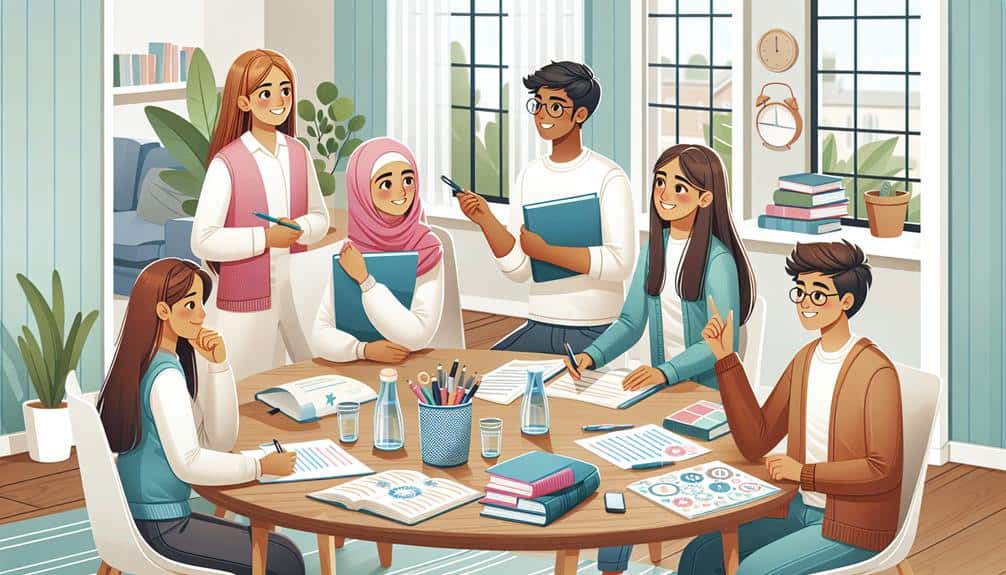Enhancing college socialization skills through homeschooling provides tailored avenues for developing strong interpersonal connections and diverse social interactions. You can engage in group projects, attend community events, and join clubs to broaden your social circle. Encourage family discussions, role-playing, and peer feedback to refine your communication skills at home. Embrace co-curricular activities, outdoor adventures, and volunteer projects for teamwork and self-expression. By participating in leadership opportunities, group settings, and community involvement, you'll cultivate essential skills for college socialization. Explore the benefits of homeschooling beyond academics to excel in interpersonal growth and social awareness.
Key Points
- Engage in diverse co-curricular activities to develop teamwork and communication skills.
- Participate in community events for social growth and exposure to diverse perspectives.
- Join leadership workshops to cultivate leadership qualities and decision-making skills.
- Practice communication and collaboration through group projects and team-building exercises.
- Utilize homeschooling flexibility for tailored social interactions and skill development.
Benefits of Homeschooling for Socialization
Homeschooling provides unique opportunities for developing socialization skills in a controlled and personalized environment. One of the key socialization benefits of homeschooling is the ability to tailor interactions to suit your child's specific needs.
In traditional school settings, children may face challenges adapting to the social norms of a large group. However, homeschooling allows for individualized attention, fostering the development of strong interpersonal skills. This personalized approach can lead to homeschooling success, as children are able to practice social interactions in a comfortable environment.
Moreover, homeschooling advantages include the flexibility to engage in a variety of social activities beyond the confines of a typical school day. These opportunities can range from community service projects to participation in local clubs or sports teams. By encouraging such diverse interactions, homeschooling nurtures well-rounded individuals who excel in various social settings.
Opportunities for Social Interaction
In diverse social settings outside the traditional classroom environment, students undergoing homeschooling have ample opportunities for meaningful social interactions that contribute to their overall development. Homeschooling allows you to engage in a variety of activities that foster socialization and personal growth. Here are three key opportunities for social interaction:
- Group Projects and Extracurricular Clubs:
Participating in group projects or joining extracurricular clubs provides a platform to collaborate with peers, develop teamwork skills, and build lasting friendships. These activities offer a chance to work towards a common goal while nurturing social bonds.
- Study Groups:
Forming study groups with fellow homeschoolers enables you to share knowledge, exchange ideas, and support each other academically. Study groups not only enhance your understanding of subjects but also cultivate communication and cooperation skills.
- Community Events:
Attending community events such as workshops, volunteer activities, or local gatherings exposes you to a diverse range of people and perspectives. These events offer opportunities to interact with individuals of varying backgrounds, helping you broaden your social circle and enhance your cultural awareness.
Building Communication Skills at Home
To enhance your communication skills at home, engaging in regular family discussions is key. By participating in daily interaction exercises, you can practice articulating your thoughts and ideas effectively.
Additionally, role-playing various communication scenarios with family members can help you develop confidence and clarity in expressing yourself.
Family Discussions Practice
Engaging in regular family discussions at home can greatly enhance your communication skills, fostering a strong foundation for socialization throughout your college journey. By actively participating in family discussions, you not only improve your ability to express thoughts and ideas but also develop essential skills for engaging in academic debates and collaborative projects in college.
Here are three effective ways to practice family discussions at home:
- Utilize Open-Ended Questions: Encourage thought-provoking conversations by asking questions that require more than just a yes or no answer. This practice helps you articulate your thoughts clearly and think critically about different topics.
- Organize Family Debates: Engage in friendly debates with your family members on various subjects. Debates promote active listening, understanding different perspectives, and constructing well-supported arguments—all crucial skills for college interactions.
- Seek Peer Feedback: After discussions, seek feedback from family members on your communication style. Constructive criticism can help you identify areas for improvement and refine your communication skills for college and beyond.
Daily Interaction Exercises
Enhancing your communication skills through daily interaction exercises at home is a practical and effective way to prepare for college socialization. Engaging in group projects with siblings or friends can provide valuable peer interactions that mimic real-world scenarios. These exercises not only enhance social skills but also offer a platform for teamwork practice.
Through group projects, you can learn how to communicate effectively, delegate tasks, and collaborate with others towards a common goal. These interactions help in developing essential social skills such as active listening, conflict resolution, and leadership. By engaging in daily interaction exercises focused on group projects, you can create a supportive environment that encourages open communication and cooperation.
Practicing teamwork at home prepares you for the collaborative nature of college assignments and extracurricular activities. It allows you to understand the dynamics of working in a team, respecting diverse opinions, and contributing your ideas constructively. These daily exercises lay a strong foundation for effective communication and teamwork, essential skills for successful college socialization.
Role-Play Communication Scenarios
Regularly practicing role-play communication scenarios at home is an effective method for building and strengthening your communication skills in preparation for college socialization. Engaging in role play exercises allows you to immerse yourself in various communication scenarios, enhancing your ability to articulate thoughts clearly and respond effectively.
Here are three benefits of incorporating role-play communication scenarios into your homeschooling routine:
- Enhanced Empathy: Role-playing different scenarios helps you understand diverse perspectives and improves your ability to empathize with others, an essential skill for successful social interactions in college settings.
- Improved Conflict Resolution Skills: By acting out communication scenarios that involve disagreements or misunderstandings, you can practice resolving conflicts diplomatically, preparing you for real-life situations where conflict may arise.
- Boosted Confidence: Through interactive activities that require you to communicate assertively and express your ideas convincingly, you can boost your self-assurance and feel more comfortable engaging in social interactions.
Utilizing Co-curricular Activities
When homeschooling, embracing co-curricular activities offers a wealth of diverse options to hone your skills. Engaging in various activities not only allows you to explore your interests but also helps in building essential teamwork skills vital for college.
From sports to clubs, these experiences provide invaluable opportunities for personal growth and socialization.
Diverse Activity Options
Exploring diverse co-curricular activities can greatly enrich the socialization skills of college-bound homeschoolers. By engaging in various activities, you can develop important social skills that will benefit you in your college journey and beyond.
Here are some diverse activity options that can help broaden your social horizons:
- Outdoor Adventures: Participating in outdoor activities like hiking, camping, or nature walks can provide opportunities to bond with peers in a relaxed setting, fostering teamwork and communication skills.
- Creative Workshops: Joining creative workshops such as painting classes, writing groups, or theater productions can help you express yourself, collaborate with others, and build confidence in sharing your ideas.
- Volunteer Projects: Getting involved in volunteer projects not only allows you to give back to the community but also exposes you to people from diverse backgrounds, helping you develop empathy, leadership, and teamwork skills.
Building Teamwork Skills
Engaging in diverse co-curricular activities not only broadens your social horizons but also provides valuable opportunities to develop teamwork skills essential for your college journey.
Participating in group projects within these activities enhances your ability to collaborate effectively with peers, an essential skill in college and beyond. Through group projects, you learn to navigate differing opinions, allocate tasks based on strengths, and collectively problem solve to achieve common goals.
Team building exercises offered in co-curricular activities are designed to foster unity and cooperation among participants. These activities encourage you to communicate, trust, and rely on your team members, skills that are integral in college settings where group work is common.
Collaboration becomes second nature as you engage in various team-building challenges, preparing you for the collaborative demands of college coursework and extracurricular projects. By actively participating in these activities, you not only hone your teamwork skills but also cultivate a mindset that values collective success over individual achievements, a mindset that will serve you well in your college socialization journey.
Community Involvement for Social Growth
Getting involved in your local community can greatly enhance your social growth and development as a homeschooled student. Community involvement offers unique opportunities to interact with diverse groups of people, develop communication skills, and foster a sense of belonging.
Here are three ways community involvement can contribute to your social growth:
- Volunteering Projects and Community Events: Engaging in volunteering projects or participating in community events allows you to connect with others who share similar interests or values. These activities provide a platform to collaborate with different individuals, learn from their experiences, and contribute positively to society.
- Group Projects: Working on group projects within your community can help you hone your teamwork and collaboration skills. By collaborating with peers towards a common goal, you can learn how to communicate effectively, resolve conflicts, and leverage each other's strengths.
- Team Sports: Participating in team sports not only promotes physical fitness but also fosters social interaction and teamwork. Being part of a sports team teaches you how to work together towards a shared objective, build trust among teammates, and develop leadership skills within a supportive environment.
Developing Leadership Qualities
Developing leadership qualities while homeschooling involves actively seeking opportunities to lead and inspire others within your community and academic pursuits. Engaging in leadership workshops can provide valuable insights and skills that will benefit you in various settings.
Team building exercises are essential for understanding group dynamics and enhancing your ability to collaborate effectively.
Leadership role play activities allow you to practice decision-making, communication, and problem-solving under different scenarios, preparing you for real-life leadership situations.
Group projects offer a chance to take on leadership roles, delegate tasks, and motivate team members towards a common goal. These experiences help you develop essential leadership traits such as communication, decision-making, and adaptability.
Preparing for Group Settings
To excel in group settings while homeschooling, focus on honing your communication and collaboration skills through hands-on experiences and interactive learning opportunities. Engaging in group dynamics and social settings can be crucial for your future success in college and beyond. Here are three key strategies to help you prepare effectively:
- Peer Interaction: Actively seek opportunities to interact with peers in group activities, cooperative projects, or community events. Learning to communicate effectively with a diverse range of individuals will enhance your socialization skills and prepare you for collaborative work environments.
- Team Building: Engage in team-building exercises or join group clubs and organizations to develop your ability to work harmoniously with others towards a common goal. Understanding how to contribute positively within a team setting will be invaluable in college and future professional settings.
- Collaborative Projects: Participate in collaborative projects that require you to share ideas, delegate tasks, and work together towards a shared objective. These experiences will help you navigate group dynamics and develop essential teamwork skills that are highly valued in academic and workplace settings.
Frequently Asked Questions
Can Homeschooling Students Join Traditional School Clubs and Organizations?
Yes, homeschooling students can join traditional school clubs and organizations, fostering inclusivity and community engagement. They can also participate in extracurricular activities like sports teams, providing valuable opportunities to socialize and develop essential social skills for college and beyond.
How Can Homeschoolers Practice Conflict Resolution Skills With Peers?
Want to hone conflict resolution skills? Engage in role-playing exercises to practice different scenarios. Join peer mediation programs for real-world experiences. Attend communication workshops for valuable strategies. Participate in group activities to enhance teamwork and problem-solving abilities.
Are There Virtual Platforms for Homeschoolers to Socialize With Other Students?
Yes, there are numerous online forums and social events where homeschoolers can interact with peers virtually. Engaging in virtual group activities fosters peer interaction and can help enhance socialization skills important for college life.
What Are Effective Strategies for Homeschoolers to Network With Professionals?
Looking to network with professionals? Engage in online workshops and networking events. Seek mentorship programs and explore internship opportunities. Statistics show 85% of homeschoolers successfully connect with industry experts through virtual platforms.
How Can Homeschoolers Maintain Friendships Outside Their Immediate Community?
To maintain friendships outside your immediate community, consider finding virtual pen pals who share your interests. Attend local community events, join clubs, and participate in online forums. Building connections beyond your circle can enrich your social experiences.



